The complete database DevOps solution
Liquibase offers version tracking, deployment, and rollback capabilities as an open source solution. Liquibase Pro builds on the open source foundation to provide a complete database DevOps solution.


Automating database change management, observability, and compliance with Liquibase
Define database changes
Define database changes as changesets using SQL or several different database-agnostic formats, including XML, YAML, and JSON. Liquibase automatically generates database-specific SQL for you.

Update and manage the same schema across multiple database types
Developers can abstract the database code to push changes to different database types simultaneously. The abstract format options offer more flexibility over a formatted SQL changelog.
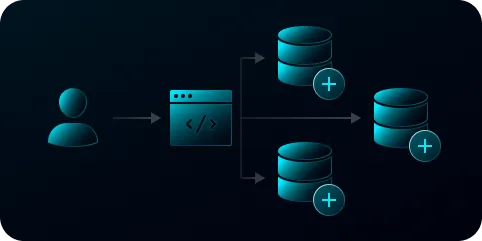
Manage changesets in one place
Database changes are managed with one ledger called the changelog. Liquibase tracks which changesets have or have not been deployed in a corresponding tracking table.
Using a unique identification scheme (an ID and author, along with the name and path of the file) users can manage and reorder database changes and reduce developer conflicts and collisions.
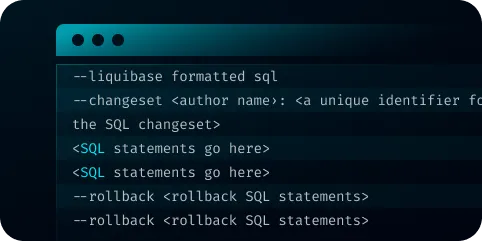
Track, version, and deploy database changes
Changelogs and tracking tables help teams track and version database changes and deployments. Developers know which changes have been deployed to the database and which changes have not. Liquibase compares the changelog against the tracking table and only deploys changes that have not previously been deployed.
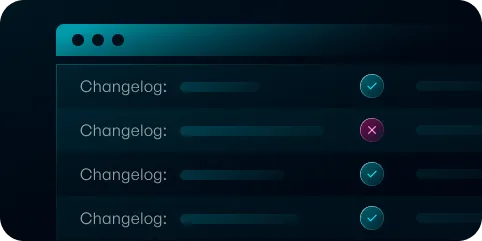
Automate database change pipelines
Liquibase Pro includes Flows to create automated database change pipelines that can be run from any CI/CD tool. Flows use modular command files to quickly define, standardize, and govern your workflows. Access controlled files can be called independently or grouped as packages to ensure process consistency and governance.
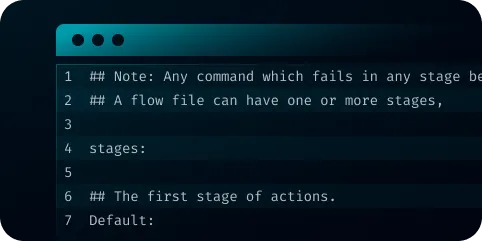
Pre-validate with Quality Checks
Liquibase quality checks are customizable tests that analyze your changelogs to ensure they match your desired format and behavior. Check files can be securely stored to avoid any unintentional or malicious changes that might compromise the integrity of the CI process. Liquibase Pro includes a set of standard checks and provides the ability to customize for the specific needs of your business.
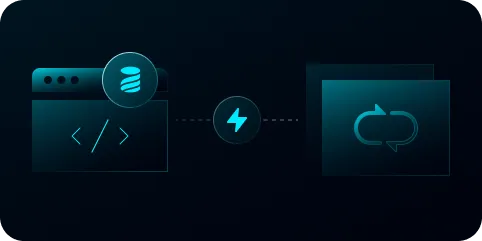
Selectively deploy changes to different environments
If your use case requires selective deployment of changes, such as between test and production environments, the Liquibase changelog allows for the addition of labels and contexts ensuring that deployments are defined in one place and appropriate changes are delivered to each target database. Liquibase supports multi-tenant scenarios if changes need to be made across a set of discrete databases.
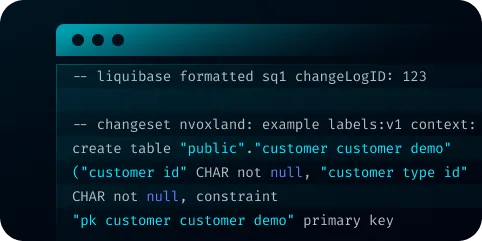
Work with Stored Logic
Liquibase Pro enables users to snapshot and work with stored logic. Snapshots allow you to get a static view of your database at a particular point in time and is useful for reporting and safeguarding your data by comparing databases (performing diffs) to find differences.

Monitor for out of process change
Liquibase Pro’s Advanced Snapshot functionality can capture known good database configuration and be used for Liquibase Pro comparisons via automation. Leverage drift reporting to quickly identify diffs and resolve them.

Rollback with confidence
Liquibase's open-source version allows users to undo changes you have made to your database, either automatically or via custom rollback SQL with the rollback command.
Liquibase Pro adds Targeted Rollbacks, which allow users to rollback a specific change or set of changes without rolling subsequent changes back, saving a lot of time and effort. Rollback validation can be automated with Liquibase Flows to ensure any future rollback will be successful.

Observe change management performance
Liquibase automatically captures all change events, as well as business defined custom fields, in your change management pipeline with structured logging. Track DevOps metrics to drive continuous improvement and create custom visualizations to track and optimize delivery performance.
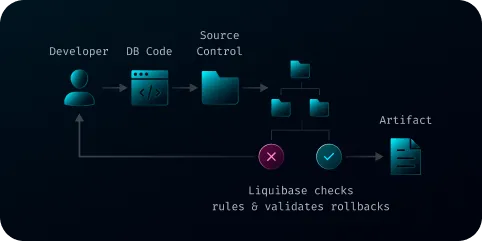
Enforce and simplify compliance
Ensure consistent processes aligned with standards and best practices are in place with automation. By managing database change as code, access to sensitive data is not required to deliver changes creating a separation of duties and keeping business critical data secure. If a compliance event occurs, reduce time to remediation with structured logs to identify the source, roll it back, and create an audit trail.

Define database changes as changesets using SQL or several different database-agnostic formats, including XML, YAML, and JSON. Liquibase automatically generates database-specific SQL for you.

Developers can abstract the database code to push changes to different database types simultaneously. The abstract format options offer more flexibility over a formatted SQL changelog.

Database changes are managed with one ledger called the changelog. Liquibase tracks which changesets have or have not been deployed in a corresponding tracking table.
Using a unique identification scheme (an ID and author, along with the name and path of the file) users can manage and reorder database changes and reduce developer conflicts and collisions.

Changelogs and tracking tables help teams track and version database changes and deployments. Developers know which changes have been deployed to the database and which changes have not. Liquibase compares the changelog against the tracking table and only deploys changes that have not previously been deployed.

Liquibase Pro includes Flows to create automated database change pipelines that can be run from any CI/CD tool. Flows use modular command files to quickly define, standardize, and govern your workflows. Access controlled files can be called independently or grouped as packages to ensure process consistency and governance.

Liquibase quality checks are customizable tests that analyze your changelogs to ensure they match your desired format and behavior. Check files can be securely stored to avoid any unintentional or malicious changes that might compromise the integrity of the CI process. Liquibase Pro includes a set of standard checks and provides the ability to customize for the specific needs of your business.

If your use case requires selective deployment of changes, such as between test and production environments, the Liquibase changelog allows for the addition of labels and contexts ensuring that deployments are defined in one place and appropriate changes are delivered to each target database. Liquibase supports multi-tenant scenarios if changes need to be made across a set of discrete databases.

Liquibase Pro enables users to snapshot and work with stored logic. Snapshots allow you to get a static view of your database at a particular point in time and is useful for reporting and safeguarding your data by comparing databases (performing diffs) to find differences.

Liquibase Pro’s Advanced Snapshot functionality can capture known good database configuration and be used for Liquibase Pro comparisons via automation. Leverage drift reporting to quickly identify diffs and resolve them.

Liquibase's open-source version allows users to undo changes you have made to your database, either automatically or via custom rollback SQL with the rollback command.
Liquibase Pro adds Targeted Rollbacks, which allow users to rollback a specific change or set of changes without rolling subsequent changes back, saving a lot of time and effort. Rollback validation can be automated with Liquibase Flows to ensure any future rollback will be successful.

Liquibase automatically captures all change events, as well as business defined custom fields, in your change management pipeline with structured logging. Track DevOps metrics to drive continuous improvement and create custom visualizations to track and optimize delivery performance.

Ensure consistent processes aligned with standards and best practices are in place with automation. By managing database change as code, access to sensitive data is not required to deliver changes creating a separation of duties and keeping business critical data secure. If a compliance event occurs, reduce time to remediation with structured logs to identify the source, roll it back, and create an audit trail.





.svg)
.svg)
.svg)







